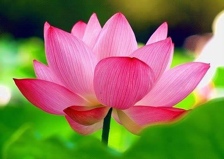The Point of All This
Shechen Rabjam Rinpoche is the grandson of His Holiness Dilgo Khyentse Rinpoche. This is an excerpt from his book THE GREAT MEDICINE THAT CONQUERS CLINGING TO THE NOTION OF REALITY
If you’ve been practicing for years, you should be seeing some results, If you’re not, you may be missing the point.
The result of spiritual practice should be our inner transformation into better human beings. After practicing for months or years, we should be less prone to anger, pride, and jealousy. Our practice should lead us to a vaster, calmer mind.
For example, the whole point of dieting is to lose a few pounds, not to collect knowledge and become an expert on each and every diet. You may have heard about different diets and read many books, but you won’t lose weight unless you put one of them into practice in your everyday life. Similarly, if you do not implement the teachings, your destructive emotions and self clinging will not diminish, and the Dharma instructions will be of no use to you, no matter how many you recieve.
Dilgo Khyentse Rinpoche always placed great emphasis on the importance of merging our mind with the Dharma and unifiying the practice and daily life. Our aim should be to blend with the Dharma in meditation and to carry the quality of the meditation into all of our actions. Dharma needs to become second nature. We ar probably not integrating our practice into our lives if, after having practiced a lot, we remain just as angry as before – or even a little more so. Another indication of a lack of integration is the absence of a sense of well-being. A genuine practicioner should at least become a good human being.
You might feel that you have some control of the mind or have made some progress in your practice, yet as soon as difficulties confront you, the mental toxins overwhelm your mind with the same strength as before. If this happens try to determine whether you are becoming a better being or not. Are you slowly getting free of the obscuring emotions? Are you enjoying the fulfillment of inner freedom?
After years of practice, we should gain a sense of inner peace and become less vulnerable to outer circumstance. Masters such as Patrul Rinpoche experienced great joy and profound happiness as a result of their Dharma practice. Inner freedom, relaxed and open happiness, and joy will arise when negative emotions and mental confusions disappear. In contrast, we will have missed the point of the practice if our mental poisons are still all-powerful, torment us constantly, and cause us to remain preoccupied with ourselves.
About ten years ago, I went to Logan Airport to pick up Zen Master Seung Sahn, who was flying in for a ceremony. Accompanying me was someon who was just about to become and abbot. On the drive back from the airport, this person asked for some advice about being an abbot, and Zen Master Sueng Sahn answered, “The abbot is everyone’s attendant.” That’s all he said. This has always stuck in my mind because it’s a very curious thing to say.
In temples in Korea, the abbot holds a very high position. When monks travel and arrive at a temple, the first thing they do is go to the abbot’s room and bow to him three times. The abbot always gets the highest seat in the Dharma room. He always gets very nice things. People give him nice clothes; he gets a nice big American car and someone to drive him around the city. And he also has many attendants. They wash his clothes and clean his big American car, and they bring him his food and everything.
But Zen Master Sung Sahn said the abbot is everyone else’s attendant. This was actually his teaching style. He often had this practice of taking Korean tradition and turning it upside down in order to teach Westerners. In Korea, only monks and nuns practice Zen and live in temples. Her in the West, we have monks, nuns, laymen, and laywoment all living together and practicing together. Also, we have laypeople wearing monastic clothing, chich is considered very strange in Korea. So he said the abbot is everyone’s attendant, which is also upside down. THis points to his teaching that the abbot’s real job is to take away “I,” “my,” “me,” put down all of his like and dislikes and just do what is best for the Zen center and for the Sangha.
Nowadays so many people have become Buddhist but don’t do practice. They are only Jack-Buddhists This creates more obstacles. We would like a truly meaningful life and Buddhahood. These are the most important goals for everyone. 2008

